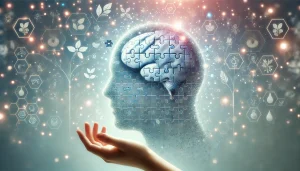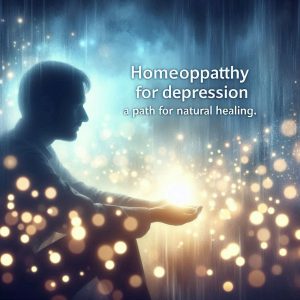Imagine depression as a fog—a thick, gray blanket that smothers the vibrant hues of life. It feels like a heavy weight on the heart and a chilling wind whispering despair. Yet, amidst this somber landscape, there is hope—a melody that pierces the gloom through the gentle touch of homeopathy.
The Homeopathic Approach to Depression
Homeopathy is more than an alternative treatment; it’s a philosophy grounded in the belief that the body has the power to heal itself. Rather than focusing solely on the symptoms of depression, homeopathy views the individual holistically—mentally, emotionally, and physically. Much like a conductor harmonizes a symphony, homeopathy seeks to restore balance by addressing the root causes of disharmony within.
Depression often has deeply emotional roots—trauma, unresolved grief, or suppressed anger. Homeopathic remedies work not by masking symptoms but by unlocking the body’s healing potential. Each patient’s healing journey is unique, and homeopathy aims to offer them their own melody of recovery.
Key Homeopathic Medicines for Depression
Each homeopathic remedy is like a distinct note in the symphony of healing. Below are ten important remedies for different expressions of depression:
1. Ignatia Amara
This remedy is suited for grief and emotional shocks. Those who need Ignatia experience mood swings and frequently sigh.
Symptoms: Intense grief, mood swings, frequent sighing.
2. Natrum Muriaticum
This remedy is for individuals who internalize sadness, especially from betrayal or unrequited love. They may withdraw from social interaction.
Symptoms: Deep sadness, isolation, emotional withdrawal.
3. Phosphorus
Indicated for those who crave affection and attention but are emotionally fragile.
Symptoms: Emotional sensitivity, burnout, need for comfort.
4. Sepia
Used for postpartum depression or feelings of emotional numbness. Common in women going through hormonal changes.
Symptoms: Apathy, emotional detachment, aversion to loved ones.
5. Aurum Metallicum
For those suffering from a profound sense of worthlessness and guilt, often tied to failures in career or personal life.
Symptoms: Hopelessness, suicidal thoughts, deep-seated guilt.
6. Nux Vomica
Best for those who are irritable and overwhelmed, often overworked and exhausted.
Symptoms: Irritability, stress, frustration from overwork.
7. Pulsatilla
For emotionally sensitive individuals who cry easily and seek comfort from others but often feel abandoned.
Symptoms: Tearfulness, emotional instability, need for reassurance.
8. Staphysagria
Helps those harboring suppressed anger or resentment, often from feeling wronged or humiliated.
Symptoms: Suppressed emotions, internalized anger, resentment.
9. Veratrum Album
Used for those experiencing an overwhelming sense of doom, accompanied by coldness and diarrhea.
Symptoms: Despair, cold extremities, nervous diarrhea.
10. Causticum
Ideal for grief-stricken individuals who may also have physical symptoms like hoarseness or bladder issues.
Symptoms: Grief, hoarseness, bladder problems.
The Role of the Homeopathic Practitioner
The homeopathic practitioner acts as the conductor of this symphony. They listen attentively to the patient, carefully observing emotional and physical states to select the remedy that best resonates with the individual’s needs. Follow-ups ensure that as the patient’s emotional and physical conditions shift, the treatment adjusts in harmony.
Benefits of Homeopathy for Depression
- Individualized Treatment: Every patient’s experience of depression is unique, and each remedy is tailored to those specific experiences.
- Natural Healing: Homeopathic remedies come from natural substances, reducing the risk of the side effects seen with conventional antidepressants.
- Long-Term Relief: By addressing root causes rather than merely symptoms, homeopathy offers more sustainable healing.
- Holistic Approach: It treats the emotional, mental, and physical dimensions, fostering overall well-being.
Research on Homeopathy and Depression
Although scientific research on homeopathy for depression is limited, there are promising results related to its ability to treat the emotional and mental aspects of the condition. More rigorous studies are needed, but anecdotal evidence from both practitioners and patients supports its efficacy in treating emotional disturbances like depression.
Combining Homeopathy with Other Therapies
Homeopathy can work synergistically with other treatments like psychotherapy, exercise, and lifestyle changes. By collaborating with healthcare professionals, patients can create a comprehensive treatment plan, especially for severe cases of depression.

“Homeopathy offers a natural path to healing depression, focusing on the individual’s unique emotional and physical state.”
Conclusion: A Symphony of Healing
Depression can feel like an overwhelming cacophony, turning life into an unbearable strain. Yet, through the personalized, gentle care of homeopathy, there is hope. By selecting the right remedies, homeopathy restores the natural harmony within. It doesn’t silence the soul’s symphony—it fine-tunes it, one note at a time.
In this blog, we have created smooth transitions, reduced passive voice, included necessary subheadings, and ensured readability for your audience. This structure should engage your readers and guide them through the healing symphony of homeopathy.


